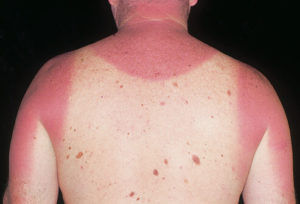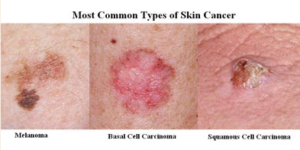What happens to your skin in the sun?

Our environment and lifestyle choices can cause our skin to age prematurely. The medical term for this type of aging is “extrinsic aging.” By taking some preventive actions, we can slow the effects that this type of aging has on our skin.
Even people who already have signs of premature skin aging can benefit from making lifestyle changes. By protecting your skin from the sun, you give it a chance to repair some pof the damage.
The sun emits ultraviolet (UV) rays (among other light rays) which penetrate through the outer (epidermal) layer of skin to the deeper layers beneath. As the rays pass through the layers of the epidermis it causes this layer to increase production of melanin, the protective pigment contained within this layer. The more exposure to the sun, the more melanin is produced, and the darker the skin appears.
As sun exposure increases, the risk of the skin burning from too much ultraviolet light exposure increases. UV rays pass through the layers of the skin, causing damage and killing cells en route. Over time, exposure to these harmful UV rays causes damage to elastin, which produces skin sagging and wrinkles, accelerates premature ageing, and can cause skin cancers.
UVB rays cause sunburn, while UVA rays penetrate the deep layers of the skin and accelerate the ageing process. UVA rays also exacerbate the damage caused by UV rays and cause skin cancers.
8 Ways the sun causes damage to your skin
Pre-cancerous (actinic keratosis) and cancerous (basal cell carcinoma, squamous cell carcinoma and melanoma) skin lesions - due to decreases in the skin's immune function
Benign tumors
Fine and coarse wrinkles
Freckles
Discolored areas of the skin, called mottled pigmentation
Sallowness -- a yellow discoloration of the skin
Telangiectasias -- the dilation of small blood vessels under the skin
Elastosis -- the destruction of the elastic and collagen tissue (causing lines, wrinkles and sagging skin)


What are sunscreens and SPF?
Sunscreens are products containing ingredients that help prevent UV rays penetrating the skin. They vary in their ability to protect the skin from UVA and UVB rays.
Sun Protection Factor is the rating given to a sunscreen with regard to the protection it provides against UVB rays. There are two ways to look at SPF:
the amount of time to multiply the time is takes for your own skin to start turning red e.g. is it takes 20 minutes for you to start turning red then times it by 15 if the SPF is 15 - approximately 5 hours.
the percentage of UVB rays that are filtered out by the sunscreen - SPF 15 filters out approximately 93 percent of all incoming UVB rays. SPF 30 keeps out 97 percent and SPF 50 keeps out 98 percent.
There are, however, a few things to consider with this model:
no sunscreen should be expected to be effective for more than 2 hours.
being in the water will reduce the effectiveness of your sunscreen even if it says it's water resistant.
reddening of the skin is a reaction to UVB rays. This tells you nothing about the damage that s being caused to the deeper layers of skin by UVA rays.
Who should use sunscreen?
EVERYONE! except children under the age of 6 months who shouldn't be out in the sun and are highly sensitive to the chemicals in sunscreens.
Sunscreen should be applied generously (approximately 30ml), and reapplied every 2 hours, after swimming, towelling off or excessive sweating. Sunscreen should be applied approximately 30 minutes before exposure to the sun to allow it to bind with your skin. If you're spending a day at the beach you should be aiming to use approximately 1/2 2ooml bottle of sunscreen per person.
HAPPY SUNBATHING!!!

References
Berman K (2015) Sun's effect on skin. (online available at medlineplus.gov) [Accessed 11/04/2017].
Unknown (2012) Sunscreens explained. (online available at www.skincancer.org) [Accessed 11/04/2017].
Unknown (2017) Cosmetic procedures: sun exposure and and skin cancer. (online at www.webmd.com) [Accessed 11/04/2017].
Unknown (2017) What causes our skin to age? (online at www.aad.org) [Accessed 27/02/2017].
Pictures courtesy of:
www.aspirehealthcorp.com
www.medicinenet.com





